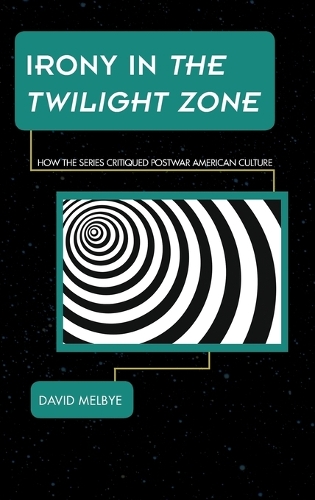
Irony in The Twilight Zone: How the Series Critiqued Postwar American Culture
(Hardback)
Publishing Details
Irony in The Twilight Zone: How the Series Critiqued Postwar American Culture
By (Author) David Melbye
Bloomsbury Publishing PLC
Rowman & Littlefield Publishers
14th December 2015
United States
Classifications
Tertiary Education
Non Fiction
791.4572
Physical Properties
Hardback
254
Width 156mm, Height 240mm, Spine 25mm
513g
Description
Rod Serlings pioneering series The Twilight Zone (1959 to 1964) is remembered for its surprise twist endings and pervading sense of irony.While other American television series of the time also experimented with ironic surprises, none depended on these as much as Serlings. However, irony was not used merely as a structural deviceSerling and his writers used it as a provocative means by which to comment on the cultural landscape of the time. Irony in The Twilight Zone: How the Series Critiqued Postwar American Culture explores the multiple types of ironysuch as technological, invasive, martial, sociopolitical, and domesticthat Serling, Richard Matheson, Charles Beaumont, and other contributors employed in the show. David Melbye explains how each kind of irony critiqued of a specific aspect of American culture and how all of them informed one another, creating a larger social commentary. This book also places the shows use of irony in historical and philosophical contexts, connecting it to a rich cultural tradition reaching back to ancient Greece. The Twilight Zone endures because it uses irony to negotiate its definitively modernist moment of high social consciousness and low cultural escapism. With its richly detailed, frequently unexpected readings of episodes, Irony in The Twilight Zone offers scholars and fans a fresh and unique lens through which to view the classic series.
Reviews
David Melbye provides meticulous analyses of the groundbreaking television seriess use of irony as a narrative strategy to critique postwar America. Melbyes book is often compelling reading and offers an important contribution to the readers understanding of The Twilight Zone and to the use of irony as a tool of social critique. As such, this book could be used in numerous popular culture, American studies, and cultural studies courses and on reading lists. * Journal of American Culture *
While The Twilight Zones stylistic reliance on irony, particularly in its twist endings, has often been noted, David Melbye is the first to effectively extend this observation, as he seizes upon irony as a useful trope for laying bare a host of cultural issues with which America, as well as much of the postwar world, was struggling in the 1950s and early 1960s. The story he tells of the various sorts of irony that Rod Serling and other writerswove into his series reminds us that the show bulks beyond the traditional genre boundaries of science fiction to form an influential critique of the various cultural pressures that were shaping contemporary America, including the new medium of television wherein serious commentary had to be spoken somewhat obliquely. Irony in The Twilight Zone is a significant addition to the literature on this series and on television itself. -- J. P. Telotte, Georgia Institute of Technology; author of Science Fiction TV; editor of The Essential Science Fiction Television Reader
Author Bio
David Melbye has taught a broad range of media studies courses at a variety of universities and academies in Southern California and abroad. He has also worked in the Hollywood television industry, contributing as a music producer for popular shows including Friday Night Lights, Queer Eye for the Straight Guy, and One Life to Live. Melbye is the author of Landscape Allegory in Cinema (2010).
